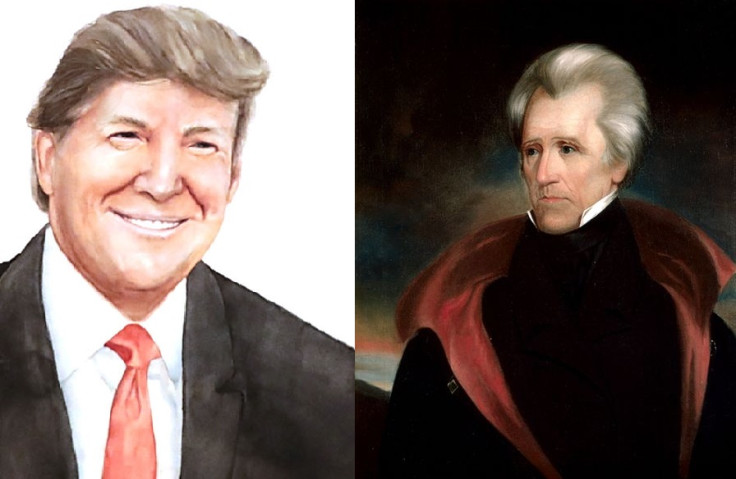How Donald Trump compares to his favourite slave-owner president, Andrew Jackson
Twenty-first Century Racists do not hate other races. They think they should stay out the way of white progress.

President Trump recently stated that tough, big-hearted Andrew Jackson would not have allowed the US Civil War. His remarks about the seventh President of the United States have led to backlash from opponents and been dismissed by supporters.
He also expressed confusion over the cause of the war, asking: "Why was there the Civil War? Why could that one not have been worked out?" It is important to look at why exactly people are concerned about his statements on the "swashbuckler" slave owner.
The Civil War ended slavery
It is not impossible to think that, had Andrew Jackson been president in the 1860s, the US Civil War would not have happened as it did. Perhaps it would not have happened at all. Jackson was a savvy military strategist. He knew how to end wars.
He also knew the benefits of slavery. Before his death, it is estimated that Andrew Jackson had owned as many as 300 people. He built a fortune in cotton by taking advantage of the system. He supported giving postmasters discretion over whether anti-slavery materials could be delivered.
The outrage over Trump's statements is not just about his failure to recall American history. It comes from the realisation that Trump cares more about whether there was a war than he does about what the war accomplished.
Andrew Jackson was racist
Donald Trump refers to Andrew Jackson often as a source of inspiration; an example of a great leader and populist. As US Army Major General, he negotiated a peace treaty with the Creek Nation that secured nearly 23 million acres for the new nation. He defeated British invaders at the Battle of New Orleans despite being outnumbered and outgunned. He is seen as the father of the Democratic Party.
Unfortunately, Andrew Jackson was also a racist. He ordered the forcible removal of Native American tribes across the Mississippi River, causing the death of an estimated 3,500 Creek and 4,000 Cherokee, and called it a "benevolent policy of the government' to resettle them far from white settlements.
Jackson's brand of racism appears to be resurging among Trump supporters. It is not the racism of Jim Crow or the Civil Rights Movement. It is racism that builds on Jackson's history, but remains unique to the 21<sup>st Century.
21<sup>st Century Racism
So what is 21<sup>st Century Racism? It is not the racism of our forefathers – the racism that hates you because of the colour of your skin. Twenty-first Century Racists do not hate other races. They just believe non-whites should stay out of the way of white progress. Non-whites who challenge established societal order are hated; those who do not pose such a challenge are simply forgotten.
It is not the President's statements, in and of themselves, that dismay onlookers – it is his failure to acknowledge the pain they cause.
Twenty-first Century Racism is the racism that thinks racism is terrible, but still sees non-Whites as 'others'. It allows one to declare, to believe, that he is not racist because he has 'a great relationship with the Blacks'.
What makes this racism especially insidious is that proliferators get to claim it does not exist. A person can decline to disavow the Ku Klux Klan, retweet the compliments of white supremacists, and still maintain he is "the least racist person you have ever met".
Those who dismiss such behaviour as 'fake news' believe their own 21<sup>st Century Racism, not because they hate non-whites, but because they do not care about them. Dismissing Trump's statements is refusing to acknowledge the effect they have on the people they diminish. It is not the President's statements, in and of themselves, that dismay onlookers – it is his failure to acknowledge the pain they cause.
This concern is the same as the one that gave birth to distress over Jackson's behaviour nearly 200 years ago, when opponents suggested his "actions would destroy the American democratic experiment". Dismissing Trump's words and behaviour is a refusal to acknowledge the effect it has on society at large. Just like Jackson, Trump is presiding over a contentious and divisive time in American history. And just like Jackson, Trump is forging ahead with little regard for those who do not get out of his way.
Gina Yannitell Reinhardt is a lecturer in the Department of Government at the University of Essex
© Copyright IBTimes 2025. All rights reserved.






















